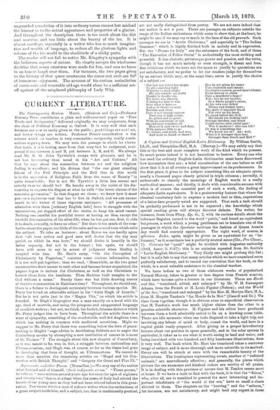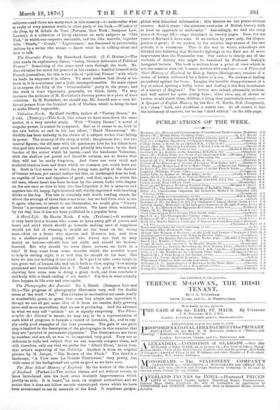A Copious and Critical English-Latin Dictionary. By William Smith, LL.D.,
and Theophilus Hall, M.A. (Murray.)—We may safely say that this is the best and most complete work of the kind which we possess. So much praise indeed it is not hazardous to bestow. Every one who has used the ordinary English-Latin dictionaries must have discovered how incomplete they are ; a brief examination of the one before us will show that it is at all events a great improvement on its predecessors. In the first place, it gives to its subject something like an adequate space, nearly a thousand pages closely printed in triple columns; secondly, it endeavouts to classify the meanings of English words in a really methodical manner ; and thirdly, it deals with considerable success with what is of course the essential part of such a work, the finding of adequate Latin equivalents. It is a praiseworthy feature that whore the classical vocabulary fails to express a modern fact or idea, expressions of a latter date properly noted are suggested. That such a task should be perfectly performed is not to be expected ; the knowledge whiela special reading gives will always discover defeats. The writer, for instance, fresh from Pliny, .4. vi., 2, with its curious details about the informer Regulus, turned to the word "patch," and found no equivalent but pannus, a word which a young gentleman set to translate one of the passages in which the Spectator satirizes the fashion of Queen Anne's day would find scarcely appropriate. The right word, of course, is splenium. Index, again, might be given as an equivalent for an "in- formant," as it sometimes has a perfectly neutral sense (Cie., Pro Cluent., 7). Coturnix for "quail" might be credited with Augustan authority (Ovid, Amor. ii. 6-27); this is an omission repeated from Dr. Smith's ‘. Latin-English Dictionary." Very likely one might prolong this list ; but it is only fair to say that many articles which we have examined seem perfectly satisfactory, and to record our conviction that the book, on the whole, is a most valuable assistance to the classical teacher.
We have before us two of those elaborate works of popularized Natural History, taken in greater or less degree from French sources, which have become quite a feature in our literature. These are Earth and Sea, "translated, edited, and enlarged" by Mr. W. H. Davenport Adams, from the French of M. Louis Figuier (Nelson); and the World of the Sea," translated and enlarged" by the Rev. H. Martyn Hart, M.A., from M. Moquin Tandon's "Le Monde de la Mer." (Cassell and Co.) We class them together, though it is obvious even to superficial observation that 31. Tandon's work has much higher claims than the other to a genuine scientific character. M. Figuier and his editor have produced between them a book admirably suited to lie on a drawing-room table. There are idle moments when one feels disposed to take a light trip, not involving any labour of mind or body, round the world, and here is a capital guide ready prepared. After giving us a proper introductory lecture about our position in space generally, and in the solar system in particular, it takes us to see what is worth seeing in land and water, and being furnished with two hundred and fifty handsome illustrations, does it very well. The book which Mr. Hart has translated takes a narrower range of subject, and is more thorough and more scientific in its method. Every one will be struck at once with the remarkable beauty of the illustrations. The frontispiece representing corals, another of "radiated animals," are marvellously effective ; and generally, the plates which picture the sea anemones and kindred orders are worthy of all praise. It is in dealing with this province of nature that M. Tandon seems most at home. If we have a fault to find with the book, it is that the "fishes," who, after all, are to mankind in general the most interesting and im- portant inhabitants of "the world of the' sea," have so small a share allotted to them. The chapters on the " herring " and the "salmon," for instance, are not satisfactory, and might lead any expert in these is really of very genuine worth in other parts of the book.— Wonders of the Deep, by M. Schele de Vera (Putnam, New York ; Sampson Low, London), is a collection of lively sketches on such subjects as "Odd Fish," in which sea-serpents, mermaids, and the like marvels, together with "Pearl'," "Corals," "Lighthouses,' are discussed in entertaining fashion by a writer who seems to know what he is talking about and how to talk.









































 Previous page
Previous page